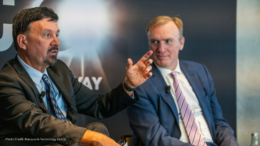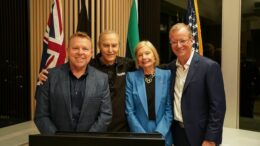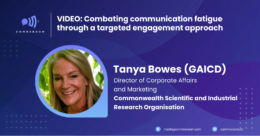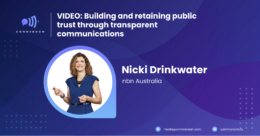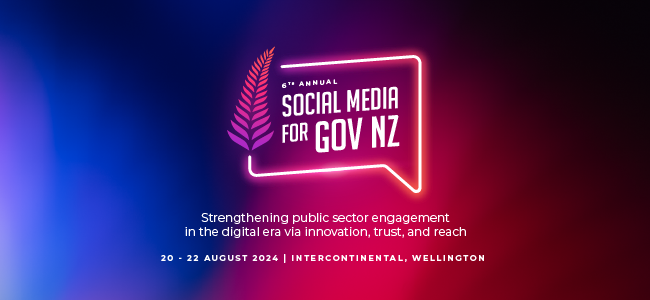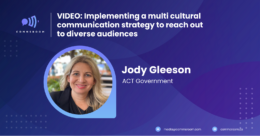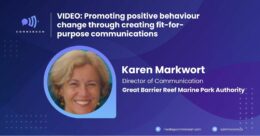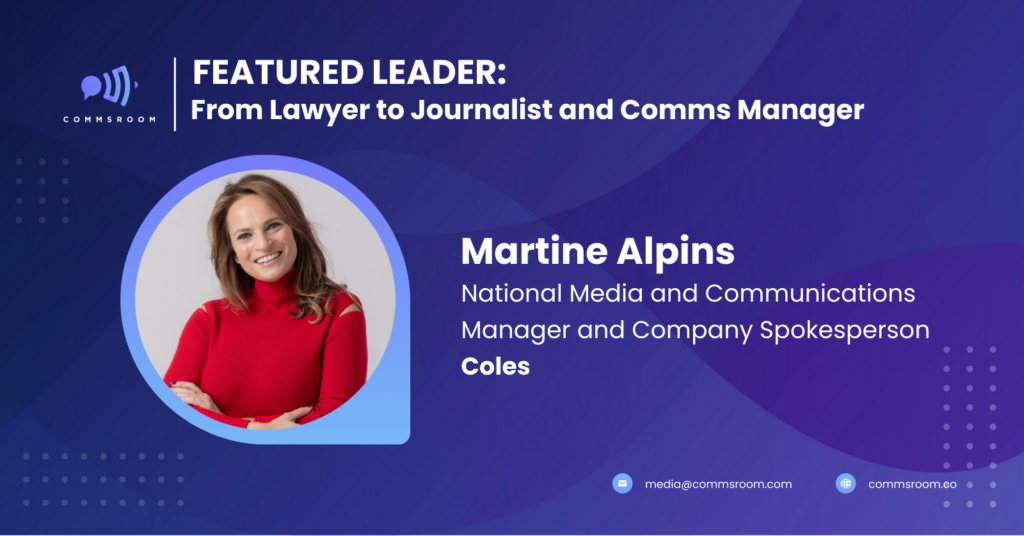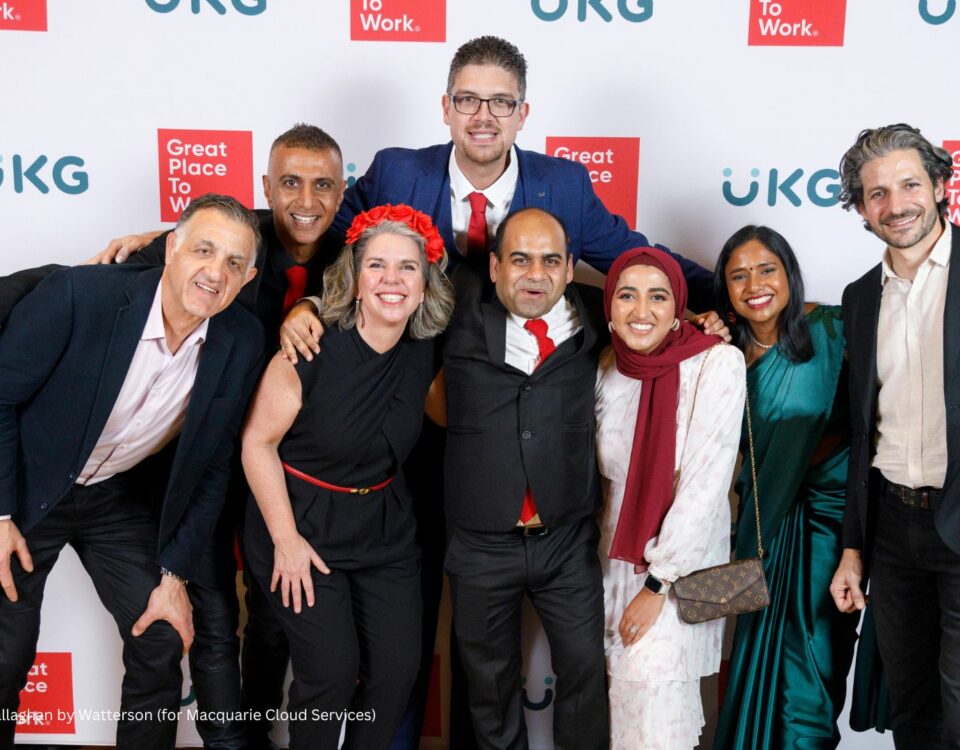When you’re designing your comms strategy, you need to work out the “Why”. Why are you deciding to communicate like this? What is the ultimate result? We all say as communications professionals that it’s very hard to determine the results, but I think you can look at a situation saying, what behaviour are we trying to change, and how can comms help change that behaviour.
- Martine Alpins is the current National Media and Communications Manager and Company Spokesperson at Coles, where she oversees external and internal communications.
- Before becoming a corporate communications practitioner, Martine was a lawyer and journalist.
- In this article, Martine talks about her journey and the kind of lessons she picked up as a lawyer and journalist that has informed her approach to communications management.
- Martine will be speaking at the upcoming Comms and Social Media Summit 2023, where she will talk about having a concrete communications strategy when operating across multiple different channels.
It’s not uncommon to see journalists make the jump to public relations, where skills such as researching, writing, and storytelling, are highly transferable. Much of that applies to Martine Alpins, who covered important events for eight years with Nine before getting hired by Coles’ corporate affairs team.
However, what sets Martine apart is the fact that two years before getting hired at Nine, she had already been a bona fide lawyer who got admitted to the Supreme Court of Victoria in 2005.
In our conversation, Martine shares the reason for her unique journey, the lessons she learned as a lawyer and journalist that informs her approach to communications, and why it’s critical to have a concrete communications strategy when operating across multiple different channels.
You weren’t always in the communications field. You practiced Law, switched to journalism and then moved on to Coles as a Senior Communications Manager. What was the journey like?
I always had the dream of being a journalist, and in particular, a TV journalist because I grew up loving the news, loving watching the news, listening to radio and reading the papers.
I wanted to be a journalist but I left school but I was quite young. I was told: go and get a law degree because it can set you up for anything in life. So I studied law and I ended up practicing and being admitted to the Supreme Court in Victoria.
I really enjoyed being a lawyer, I enjoyed the camaraderie with my other graduates, it was a really great experience. In particular, learning the importance of attention to detail and the value of contracts and agreements, particular parties keeping their word. I think the discipline really set me up well. But something inside me, when I was a second year lawyer just said, “I need to go back and follow my dream,” which was, to be a reporter.
I went back to do a postgraduate diploma of journalism at RMIT university in Victoria, and that course was a year long. I knew that I had to go and get practical experience. So I was getting work experience anywhere I could, from Channel 10,ABC, WIN TV and production companies. I came to discover that I loved content and I loved telling stories.
There were some challenging moments like covering Black Saturday bushfires. Being a journalist really gave me a really quick understanding of how the world worked and in particular crisis communications.
How I got into Comms is a really interesting story and sometimes I feel like I might have manifested this myself. For a couple of years while I was at Channel 9, I was asked to report on A Current Affair a national program on Channel 9 at 7 o’clock that often focussed on consumer issues.
I quickly learned to love consumer stories because they affected everybody. Everyone shops, everyone needs to buy their groceries, everyone needs to buy clothes. Everyone needs to set up their homes.
I was based in Melbourne reporting on A Current Affair and would often be at Coles supermarkets, interviewing various executives or store managers. I was genuinely interested in what went on behind the scenes.
I had a real interest in what they did and I think I loved the fact that it’s such a big organisation with so many different products, so many different stores and so many people who worked there across the country.
I was very fortunate to be offered a job to work in the Corporate Affairs team at Coles nine years ago.
I was actually seven months pregnant with my second son at the at the time when I got the job which was unusual and challenging. But it was a really great opportunity The demands of the roles perfectly combined my legal skills with my journalism skillsand I was incredibly grateful for the opportunity and still had a lot to learn!.
What lessons have you learned as a lawyer and journalist that you have taken with you as Coles’ National Media and Communications Manager?
I think in law, I learned attention to detail is very important. Also writing skills, making sure that you are getting everything accurate, embracing working as a team to achieve an ultimate goal. Working in law was a great introduction to corporate life.
I think I learned corporate structure and process in my legal role. I also learned about regulators like the ACCC because I was practising competition and consumer law.
In journalism, I learned how to ask questions and get the answers. I think as a communications professional, it’s really important that you can ask the right questions of people you work with. You need to get the answers, and you need to be able to translate all those questions and answers into digestible pieces of content that you can then share either with your team members, with customers, with shareholders or with suppliers.
I think the skills in journalism to be able to go and film a story for the day, gather all the information, put it into a 2 minute package that would go to air and be watched by hundreds of thousands of people that evening, that was a crash course in communications.
What do you love most about working at Coles?
I love the diversity of the job, and I love the people that we get to work with. I think it’s important when you work in communications that you really get to know the business that you work in and that you’re aligned with its values and purpose.
Coles provides people with food and groceries which is a really big responsibility and an essential service. When I worked at Coles during the COVID-19 pandemic, we were communicating with Australians on a daily basis on issues such a food supply, safety measures, employment opportunities and trading hours. I have never felt so proud of a team or organisation I’ve worked with..
How important is it to have a concrete communications strategy when operating across multiple different channels?
Having a concrete communications strategy is critical to our roles as communications practitioners. In an organisation like Coles, we have channels that speak to our customers, our 120,000 team members, our thousands of suppliers and our shareholders. It’s important that messaging is communicated through the line and that we don’t deviate from that message.
That being said, it is still important to tailor your communications to the audience that you are speaking to and make it relevant to them, and not just copy and paste and put it in every channel.
You also need a really good oversight of when all these messages are going through, the timing of the messaging, who needs to hear first, and who they need to hear it from.
It is absolutely important especially as communications grows and the channels grow, that you have a very concrete strategy in place.
We’re all challenged on how we communicate on platforms like TikTok and other channels that are just a little bit out there for corporate communications. But I think they’re actually very powerful tools.
What’s your best piece of advice for people looking to get a career in communications?
The important thing is to never think you know it all, and always want to learn. Speak to as many people as you can and step outside what you’re doing and get a bit of perspective on the communications that you’re doing.
If you’re working in an organisation, get to know that organisation really well. Speak to people and ask them what keeps them up at night, what they’re worried about. That’s often when you’ll get the most honest answer.
When you’re designing your communications strategy, you need to work out the ‘Why.’ Why are you deciding to communicate like this? What is the ultimate result?
We all say as communications professionals that it’s very hard to determine the results, but I think you can look at a situation saying, what behaviour are we trying to change, and how comms can help change that behaviour. Finally, really work with the teams, and respect those people around you
Martine Alpins will be speaking at the Comms and Social Media Summit 2023. Catch her session by registering your slot today.





